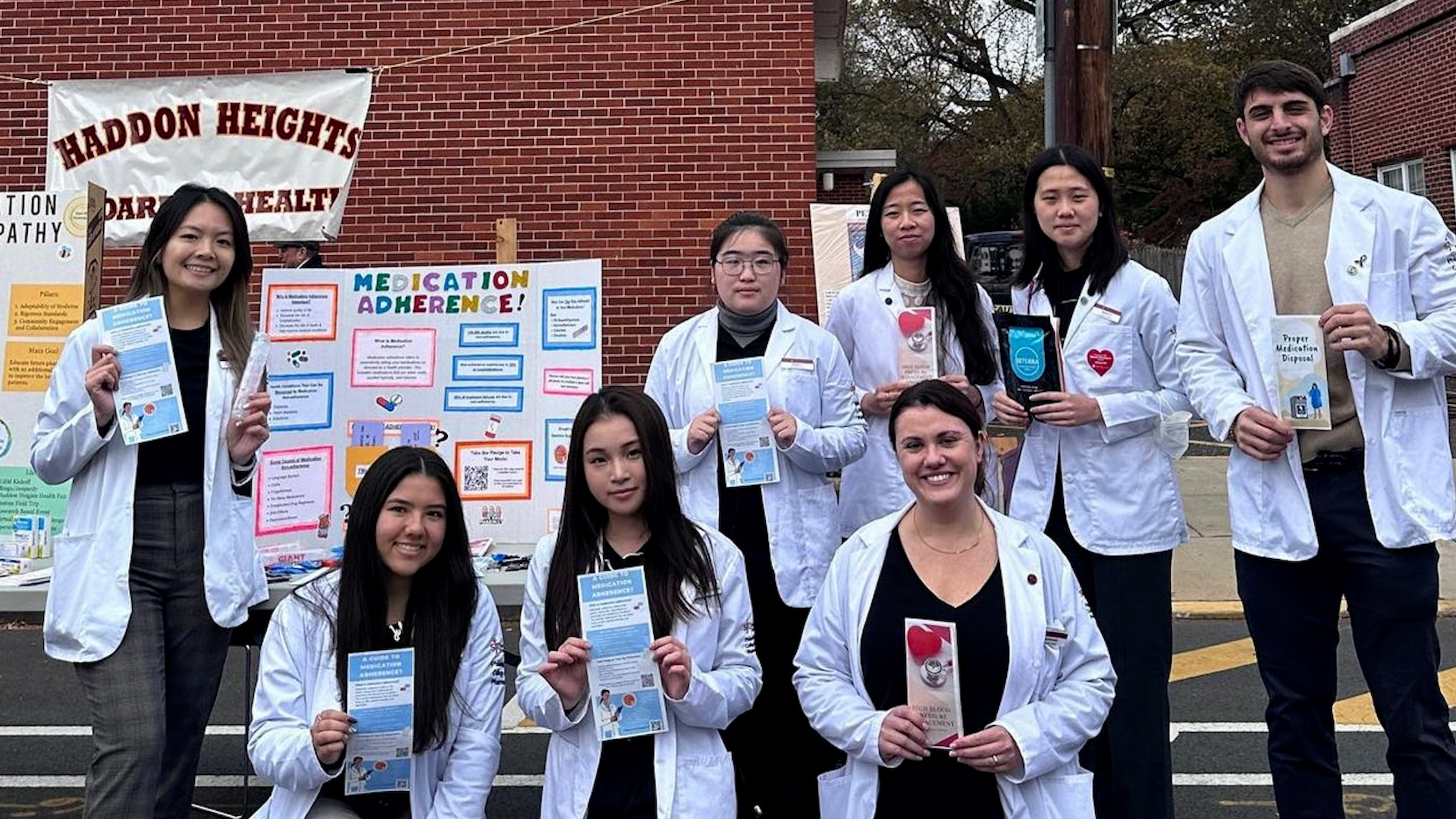Saint Joseph’s Addresses Growing Mental Health Crisis with Programs in Mental Health, Addiction Counseling
According to the Substance Abuse and Mental Health Services Administration, nearly 20% of adults in the United States experience mental illness. To meet the needs of this growing crisis, Saint Joseph’s School of Health Studies and Education is introducing new graduate programs in clinical mental health counseling and addiction counseling, enrolling in fall 2021.

- To meet the rising need for mental health counselors, Saint Joseph’s School of Health Studies and Education is launching a new clinical mental health counseling M.S. and an addiction counseling certificate, accepting students for fall 2021.
- The 12-credit addiction counseling certificate can be taken together with the M.S. or as a standalone credential for students who already have a master’s in counseling or related helping profession.
- The certificate meets the academic requirements for the Certified Advanced Alcohol and Drug Counselor certification and the National Board for Certified Counselors’ Master Addictions Counselor.
- The 60-credit clinical mental health counseling M.S. meets requirements for PA’s Licensed Professional Counselor, and the National Board for Certified Counselors’ National Certified Counselor and Certified Clinical Mental Health Counselor credentials.
- Students in both the clinical mental health counseling M.S. and addiction counseling certificate will have the opportunity to work with the University’s Center for Addiction Recovery and Education (CARE).
Since its opening in 2018, the School of Health Studies and Education at Saint Joseph’s University has been generating growth and expanding the University’s footprint in the fields of health and wellness. Under the leadership of Dean Angela Rowe McDonald, Ph.D., LCMHCS, NCC, the school began the process of pursuing new accreditations for its programs, supported the opening of the University’s new Center for Addiction Recovery and Education (CARE) and revamped programs. Now, the school is introducing its first offerings in the field of counseling — a clinical mental health counseling M.S. and an addiction counseling certificate.
Both programs are focused on developing ethical, highly skilled and empathic practitioners in helping professions that are in high demand throughout our region, and will begin enrolling students in fall 2021.
“Through our current health studies and education programs, we already pay special attention to mental health issues. This includes training educators and health professionals to understand when they need to partner with or refer to a specialist,” says McDonald. “With the new counseling programs, we will now be able to prepare and educate those specialists — mental health practitioners who can help individuals achieve their goals and live full meaningful lives.”
The Growing Need for Counselors Amid Two Epidemics
According to the Substance Abuse and Mental Health Services Administration, nearly 20% of adults in the United States experienced mental illness in 2019. Additionally, throughout the COVID-19 pandemic — which hit amid the fight against an ongoing opioid epidemic — the country has seen an increase in cases of anxiety, depression, and drug and alcohol addiction.
In the Philadelphia region, the mental health crisis has been evident for some time. Main Line Health’s 2019 Community Health Needs Assessment noted that one in four residents has been diagnosed with a mental health condition. Local community leaders indicated mental health problems as the most pressing issue in the Southeastern Pennsylvania region, followed closely by opioid use disorder.
This has created a growing need for counselors. According to the Bureau of Labor Statistics, just under 100,000 new counseling jobs are projected through 2028. This is an over 20% projected growth rate, far outpacing the 5.2% for all other occupations. The creation of the clinical mental health counseling M.S. and addictions counseling certificate responds to this increased demand and specifically to the prevalence of co-occurring mental health disorders and addictive use disorders.
“These programs will allow SJU to directly address this challenge and create mental health counselors in the area of high need,” says McDonald, adding that students will have an advantage as practitioners who train in Philadelphia, one of the nation’s largest centers for health care and education, and particularly at Saint Joseph’s, a leader in those sectors.
“It’s helpful to be in an area that’s rich in health care and education because both sectors have seen a need to coordinate with addiction and recovery specialists,” says McDonald. “To truly address these issues in our region, everyone has a role to play. If a health care system or school district doesn’t have a rich pool of providers to connect with, access to needed care is limited. The goal is to create practitioners who can fill that need and understand how to work with those in education and health care to serve their patients.”
The programs build upon the longstanding success of the University's health-related programs and Saint Joseph’s recently established CARE. The 12-credit, fully online addiction counseling certificate can be pursued as a standalone credential for new or existing practitioners who have completed a master’s in counseling, or it can be earned as part of the M.S. program with no added credit requirement.
Preparing Mental Health and Addiction Counselors for Licensure and Certification
The new School of Health Studies and Education programs are not just focused on theory, but also designed to equip those who seek to be practitioners in the field — offering hands-on learning and building in academic requirements necessary to achieve certifications. The degree program meets Pennsylvania requirements for the Licensed Professional Counselor and National Board for Certified Counselors requirements for the National Certified Counselor and the Certified Clinical Mental Health Counselor credentials. The addiction counseling certificate meets the academic requirements for the Certified Advanced Alcohol and Drug Counselor certification and the National Board for Certified Counselors’ Master Addictions Counselor .
“The curriculum for both of these programs is really designed to meet national accreditation standards while also being tailored to address regional needs,” says McDonald. “Our hope is that many of the graduates of this program will stay in the region to help address the critical needs here, but we also want to prepare them with the ability to take their degree anywhere in the country and be able to serve their patients.”
Covering topics such as individual, couple, family and group counseling, the clinical mental health counseling program will equip counselors with the knowledge and practice to be able to help their patients develop behaviors and skills to manage and recover from stressors and problems of living, addiction, relational difficulties, self-harm and thoughts of suicide, and mental health disorders such as anxiety and depression. Students in the program will obtain 700 hours of clinical experience through supervised practicum and internship experiences.
Students in both the M.S. program and the addictions counseling program will have the opportunity to participate in the work of CARE.
“CARE has already built such a strong network of health care and recovery professionals and providers that will offer our students an incredible opportunity to connect with and learn from seasoned experts,” says McDonald. “There will be many opportunities for collaboration between these academic programs and CARE.”
The Counseling Curriculum
To prepare clinical mental health counselors and addictions counseling specialists to work in a variety of settings including private practice, education, health care and community agencies, the M.S. and certificate program cover a wide range of topics.
Courses in the clinical mental health counseling M.S. program include:
- Ethical, Legal and Professional Issues in Counseling
- Counseling Across the Lifespan
- Cultural Diversity, Identity and Social Justice Issues in Counseling
- Crisis Counseling for Trauma, Violence and Abuse
- Addictions Counseling
Courses in the addiction counseling certificate program include:
- Family Systems and Addictions Counseling
- Prevention, Diagnosis Treatment and Recovery in Addictions
- Psychopharmacology and Addictions Treatment
Both programs are open to full- or part-time students. Most full-time students can complete the M.S. degree in two years, including one summer of full-time enrollment, while the certificate program can be completed in as little as two semesters.
The master's in clinical mental health counseling and addictions counseling certificate are enrolling for fall 2021. Visit the program webpages or contact graduate@sju.edu for more information.



